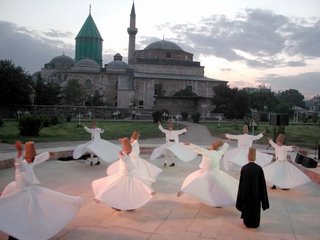Wednesday, November 15, 2006

Is AUB a microcosm of Lebanon?
A couple of weeks ago at the American University of Beirut we had student elections for to coveted positions of representatives. The air was filled with chants and cheers, and the razor-shape divide between the two coalitions of parties in AUB perfectly reflected the coalitions of the various political parties outside.
There was the March 14th coalition and the March 8th coalition. The March 14th coalition I found out encompassed the Progressive Socialist Party, the Lebanese Forces (loyal to Samir Geagea) and the Future Movement (loyal to Hariri). The opposing March 8th group was comprised of Hezbollah and Amal (the two most prominent Shia Parties) and the Free Patriotic Movement (mostly Christians loyal to Michele Aoun).
In parallel to the elections at AUB is the drama of Hezbollah calling for a new election in the Parliament, the resignation of 6 Parliament members, and the resultant tension pervading the thoughts and precautions of almost everyone.
As I walked around the campus I was baragged by campaigners who were graciously offering to help me to the front of the queue ("I know someone at the front" they would say) and of course this favor should be returned by my votes. When I finally made to leave campus at 6:00pm I walked passed the West Hall to see how things were going, since the voting had been finished for an hour. As soon as I stepped around the corner to the plaza in front of the hall I was swept into a crowd of hundreds life a piece of driftwood in a storm. It took me a literal 15 minutes to cross my way through the 50 meter space as the constant eddies of the current turned me to and fro, so helpless was I (even with my new found Lebanese pushiness) to push my way through.
When I reached the other side, and two of my friends with whom I was driving home we headed for the main gate. Once there we realized that this was the reason I had seen machine-gun armed policemen all over campus throughout the day. There in the street in front of the gate was a crowd of people (not AUB students) waiting to hear the results. Between them and us, now standing under the archway, where about 15 Riot police with their fiberglass shields and helmets. We were ushered swiftly through the gate out into the street, and a nod from the guard at the gate allowed us through the second rank of M-16 totting soldiers and on our merry way to the car.
I thought a bit about this while we walked the few blocks to where we parked. I was not daunted in the slightest by the situation, I felt comfortable, and at home in the chaos. I am surprised at myself that, like my Lebanese brothers, I have changed my attitude toward such things and see them almost as exciting events rather than scary or crazy situations. Yet, I also felt glad to be in the car and driving toward our home in Antelias and away from these volatile sectarian politics.
God have mercy on this country!
Tuesday, November 14, 2006

Cultural Adjustments
What is the good of learning about a new culture, living in a new culture and learning it from the inside-out? Why, if my own cultural experience in the states is sufficient, do I kill myself trying to adapt to a new one?
Selections from a letter I received from a friend shed some light on the issue...
Brian,
Greetings from Manila!
I gather you are finding the cultural difference more significant and difficult to adjust to than they were in Ireland (they are). But it is still much less than it would be if you were living with the Lebanese Muslims, not to mention the Bantus.
These experiences are very valuable because they force some changes that we would never have made on our own. It makes us much more able to deal with cultural differences and people of other cultures. Some things the "others" do are probably better, others worse, but the key thing is getting to the point where you can accept cultural differences as such and work with them — somewhat like accepting the weather. Some people never can, and they are pretty much useless outside their home situation. They do not have an inter-cultural capacity (or, as some say, they are not very cosmopolitan).
Connected to this is an internal change, which means that you take less of your own cultural ways for granted. Even if you prefer them (most people prefer the culture they have been raised in), at least you don't absolutize them. Once that changes, it is amazing how different the world looks, as I suspect you already know. That in turn gives you more detachment and cultural flexibility.
One of the great blessings of international community life is the chance to adjust to a new culture with a great deal of help.
I think that, as you say, you will find all this quite valuable and character forming — in the long run, of course.
Often I experience stretching on the most menial of issues: how we wash the dishes here, the time it takes to prepare a meal, the way people drive (you have to have been here to know what I mean) or just the formalities of relating when one enters a room full of people. When I think about these day-to-day challenges for me, I am learning to be patient and not always needing to do things the "Western way." I learn to not only accept a different culture than my own, but to accept others for being the way they are also. I am often confusing what is a cultural difference and what is a personal difference, and as I resolve not to worry about which is which, I learn to out aside my own preferences more and more.
There is no doubt that I am still an American, as much as people say- "Now you are becoming Lebanese!" I still have my preferences, and as Steve said above, most people prefer the culture that they grew up in. I miss the States, but not badly; and as I am beginning to see these differences not as mix-ups that I must deal with, but rather as legitimate alternatives, I am experiencing more peace about my life here, about those around me, and about myself.
Sunday, November 05, 2006

 Al-Kitaab fil Taallum al-Arabiyya
Al-Kitaab fil Taallum al-ArabiyyaHave you ever learned a new language? Although I have studied Latin and spanish in the past, I have never really settled myself to the task of grasping a new language completely. I have finally decided to do that, I had the foresight of chosing a nice easy one like Arabic. What can be so hard about it? That is exactly what I try to tell myself when I am trying to read something after 4 months here and can barely make the sounds.
Frustration. Challenge. Goal. Determination. Patience. Practice. Time.